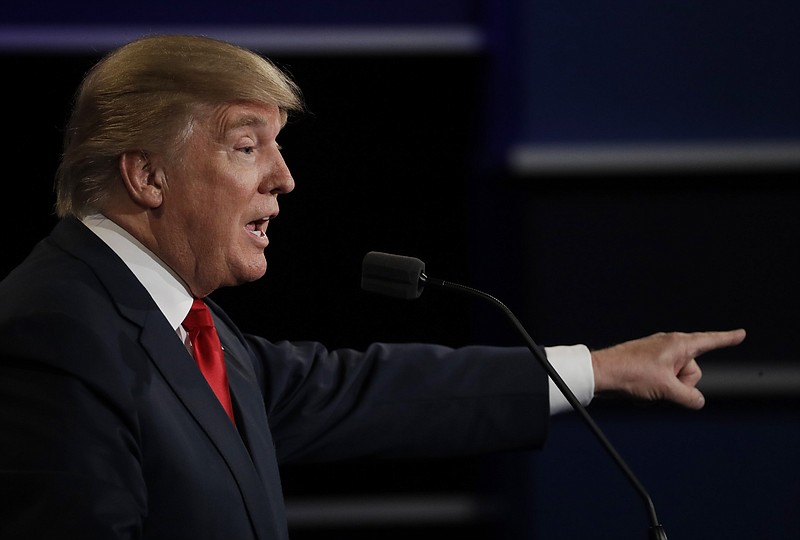Once Donald Trump opened his mouth and delivered an unscripted remark, which he does both to his benefit and his detriment, the pundits had their moment.
"I will look at it at the time," he said when asked Wednesday during the third and final debate with Hillary Clinton if would accept the results of next month's presidential election. "What I'm saying it that I will tell you at the time. I will keep you in suspense."
What had he actually said? That he wouldn't ultimately accept the results? No. That he was certain of voter fraud that would change the results? No. That he would contest the election? No. That he would sue to change the results? No.
Trump, the Republican candidate, said he would look at the results. If Clinton, the Democratic candidate, wins by 6 percentage points, as some of the polls show, he could find 2 percent voter fraud and it still wouldn't change the results. As a smart businessman, he would be unlikely to contest such a finish.
On the other hand, if he were to lose in a razor thin majority, he ought to "look" at the results. After the vote narrowed in Florida in 2000, putting the race with then-Texas Gov. George W. Bush in doubt, then-Vice President Al Gore "looked" at the results, withdrew his concession and waited for the mandatory recall procedure to kick in. After the Supreme Court ruling ended the election, he accepted the results.
In 1960, when then-Sen. John F. Kennedy defeated then-Vice President Richard Nixon by less than two-tenths of one percentage point, when there was voter fraud in a number of states, Nixon "looked" hard at the results. Many of his advisers and several influential Republican senators urged him to contest the election, but in the end - after three days, though - he chose not to do so.
But Trump, in the debate, had given the media its moment. And Clinton helped, breathlessly responding it was "horrifying" someone might question a potentially close election.
Moments such as these are what have rendered the presidential debates this year a practically useless exercise. The three head-to-head battles between the two major-party candidates have been more about what one candidate - Trump - said than about what one candidate - Clinton - did.
Examine for a moment the reaction to the first hour of the debate: "a surprisingly sedate affair," "no outbursts or interruptions," "civil disagreements," "substantive and stayed on topic," "a sober start."
Heaven forbid the candidates talk about the differences between them. What kind of "must see TV" is that?
When they did, Americans - any who hadn't paid attention up to now - learned Clinton would like a Supreme Court that does "not reverse marriage equality," does "not reverse Roe v. Wade" and stands "against Citizens United." They heard her say she would not oppose partial-birth abortion because she does not think "the United States government should be stepping in and making those most personal decisions."
They listened as she said she did not "want to see the deportation that Donald has talked about." She chose to confuse the public by attempting to tie a WikiLeaks release of one of her speeches when she called for "open borders" to a Russian conspiracy. They heard her reveal that under President Obama "most of the gains in the last years since the Great Recession have gone to the very top" but that she, by making "the wealthy pay their fair share" and making "corporations make a contribution greater than they are now," would make things better even while running for a third Obama term. She also said she would be "able to get entitlement spending under control with more resources and harder decisions."
Perhaps Clinton's biggest laugher was this: "I also will not add a penny to the debt." It ought to be the headline of every news outlet's report on the debate. Instead, the headline is Trump's thought that he would "look" at the results.
Meanwhile, Trump mentioned taking care of veterans, the country's depleted military, repealing and replacing Obamacare, cutting business taxes, how the Obama administration has made Iran powerful with a nuclear deal and $1.7 billion in cash, making NATO nations pay their fair share, negotiating better defense agreements, stopping radical Islamic terrorism in the U.S., supporting the Second Amendment, and securing the border, stopping the drug flow and deporting those who are "bad hombres."
The two forecasts for the country couldn't be more different. But such "sedate" discussions do not make headlines - not when one candidate has the audacity to say he would "look at" the results on election night. It's a pity as political discussion that this is our bar.
